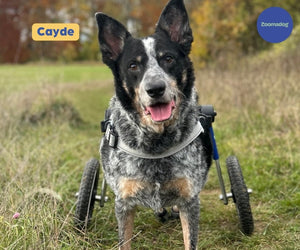What Causes Itchy Skin In Dogs?
Dry or itchy skin can be caused by a number of reasons. Most commonly, however, it’s triggered by parasites, such as fleas, poor diet, or an allergy to something in your dog’s food or environment. Sometimes itchy skin can be caused by a condition like Cushing’s Disease or Hypothyroidism.
Somewhat surprisingly, dogs can be allergic to grass, beef, chicken or dairy. Perhaps less surprising is that some dogs aren’t well able to tolerate household items such as household cleaners, shampoos, pesticides, or certain plants.
Allergies:
- Flea Allergy Dermatitis (FAD): Flea bites can trigger an allergic reaction - flea allergy dermatitis in dogs - leading to intense itching. Even a single flea bite can cause discomfort in sensitive dogs. Although they can be found anywhere, flea bites are often around the hind legs, tail base, and rear end.
- Food Allergy: If your dog is allergic to something in their diet then you’ll likely notice that the skin around their paws, face, armpits, and belly has changed. 10% of dogs with itchy skin or persistent skin issues that are severe enough to need vet care, are estimated to be affected by food allergies.
- Environmental Allergies: Dogs can develop allergies to various environmental factors, including pollen, mould, or dust mites. If your dog’s suffering from environmental allergies, you might notice them flare up during certain seasons. They can also present all year around. These allergies often change the skin around the face, belly, and paws.
- Canine Grass Allergy: Caused by pollen that floats through the air, which is then absorbed through your dog’s skin and nasal passages, the pollen then can cause an allergic reaction. Your dog’s coat will also pick up pollen, from the grass itself but other surfaces that may have pollen on it, such as the ground. In high pollen season, it could be coming into the house via shoes, clothing, and even your body. Itchy skin is one of the symptoms of a grass pollen allergy.
- Contact Dermatitis: Your dog may be allergic to everyday substances such as household cleaners, shampoos, insecticides, or plants. You’ll notice skin irritation, and lots of itching, mainly in the area that touched the contact allergen.
Dry Skin: Insufficient moisture in the air, especially in dry climates or during winter, can lead to dry skin, causing discomfort and itchiness.
Skin Infections: Bacterias and fungal (yeast) skin conditions cause itching. The infections can be secondary to another condition, such as an allergic reaction or systemic illness. The body and skin then become vulnerable to infection. When there’s an infection (pyoderma/impetigo), it’s probably that there’ll also be patches of missing fur, scaling of the skin, crusts, discharge and maybe a strong smell.
An Underlying Condition: Sarcoptic Mange (scabies/mites) - particularly if you live in an area with a high fox population, autoimmune disorders, or Cushing’s Disease.













